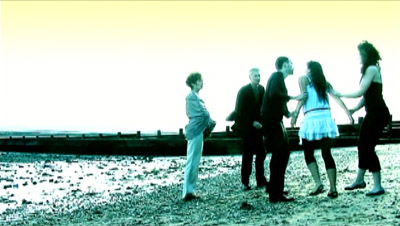The more extreme relationships in this version of the play transform the meaning of almost every line in the scene (at least, those that survived the edit). It occurs under a quay on a muddy beach where Ophelia is brought to the Queen by Horatio and the Gentleman, where they exchange sarcastic barbs. It's a reversal. Instead of the Queen trying to avoid the mad young girl, she instead has the disruptive Ophelia brought to her for a scolding, either on her orders or by Horatio's initiative. Why is Gertrude so aloof? We have to remember that in this version, the slain Polonia was Ophelia's SISTER, a sister having an affair with Claudius. The Queen may be transferring resentment to the mistress' sister. The scene also suggests a similar adulterous relationship between Claudius and Ophelia, as the songs (here just shouted rhymes) about "tumbling" are thrown the King's way. And he seems particularly empathetic, though again, this may be transference as she was his lover's sister. Either way, the mistrust in the Queen's eyes is what creates the ambiguity.
Oddly, the songs are not gender-translated like the rest of the play. "He is dead and gone" can now only mean Hamlet, because Ophelia has lost no father. Hamlet isn't dead, though they might have said that to comfort her. She might be talking about Hamlet Sr., as she is one of the people who seems able to see the Ghost when she's high on heroin. Fodor had a perfect excuse for Ophelia's madness even in his modern context, but he doesn't seem to use it here and the scene is the weaker for it. Polonia was Ophelia's pusher, and the girl could have been crashing hard at this point. However, the performance has none of that, and the way Ophelia recites the songs by rote, without inflection or inner discourse, doesn't work either as withdrawal OR madness.
Fodor suggests a number of dark happenings in both past and present, but they don't come together satisfyingly in this scene.


No comments:
Post a Comment